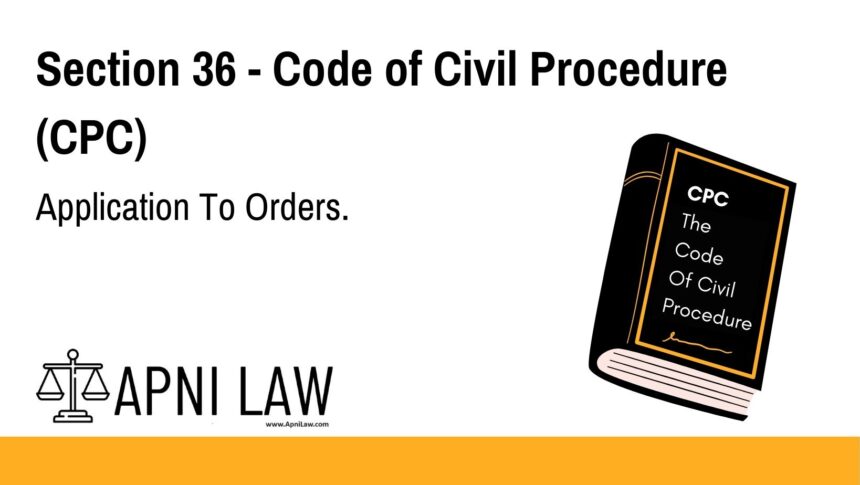Code
CPC1[36. Application to orders.– The provisions of this Code relating to the execution of decrees
(including provisions relating to payment under a decree) shall, so far as they are applicable, be deemed
to apply to the execution of orders (including payment under an order).]
Got it 👍
Here’s the SEO-optimized structured article for Section 36 CPC – Application to Orders with proper formatting, explanation, illustration, and FAQ. I’ll also make the section reference internally linkable to your ApniLaw page (like we did earlier with BNSS sections).
Section 36 CPC: Application to Orders
Code
Section 36 – Application to Orders
The provisions of this Code relating to the execution of decrees (including provisions relating to payment under a decree) shall, so far as they are applicable, be deemed to apply to the execution of orders (including payment under an order).
📖 Source: Section 36 CPC – Application to Orders (ApniLaw)
Explanation
Section 36 CPC clarifies that the execution provisions applicable to decrees are also applicable to orders.
- Decree vs. Order: While a decree formally decides rights in a suit, an order may decide incidental or procedural issues.
- Execution of Orders: Just like a decree, an order may also require enforcement—such as payment of money, delivery of property, or compliance with directions.
- This section ensures that orders are not left unenforceable and can be executed in the same manner as decrees.
In simple words, Section 36 bridges the gap between decrees and orders by extending execution machinery to both.
Illustrations
- Example 1: Payment Under an Order
A court passes an order for interim maintenance in a matrimonial case. The husband fails to pay. This order can be executed as if it were a decree for payment. - Example 2: Order for Costs
The court directs a party to pay litigation costs (under Section 35 CPC). Such an order can also be executed just like a decree. - Example 3: Order for Possession
A temporary injunction order requiring a party to vacate premises can be executed through the same process as a decree of possession.
Common Questions and Answers
1. What is the difference between a decree and an order under CPC?
A decree conclusively determines the rights of parties in a suit, while an order deals with procedural or incidental issues during the course of proceedings.
2. Can an order be executed like a decree?
Yes. Section 36 CPC expressly provides that execution provisions for decrees apply to orders as well.
3. Does Section 36 cover interim orders also?
Yes, interim orders (e.g., interim maintenance, injunction orders) can also be executed like decrees.
4. How is an order for costs executed?
An order for costs is enforced through the same mechanism as a decree for payment of money.
5. Why was Section 36 necessary?
Without this provision, execution of orders might have been disputed. Section 36 removes ambiguity and ensures enforceability of orders.
Conclusion
Section 36 CPC ensures that orders of a court are as enforceable as decrees by applying the same execution procedures. This provision strengthens judicial authority, ensures compliance with court orders, and prevents parties from disregarding non-decree directions of the court.
👉 For full bare act details, visit: Section 36 CPC – Application to Orders (ApniLaw).








